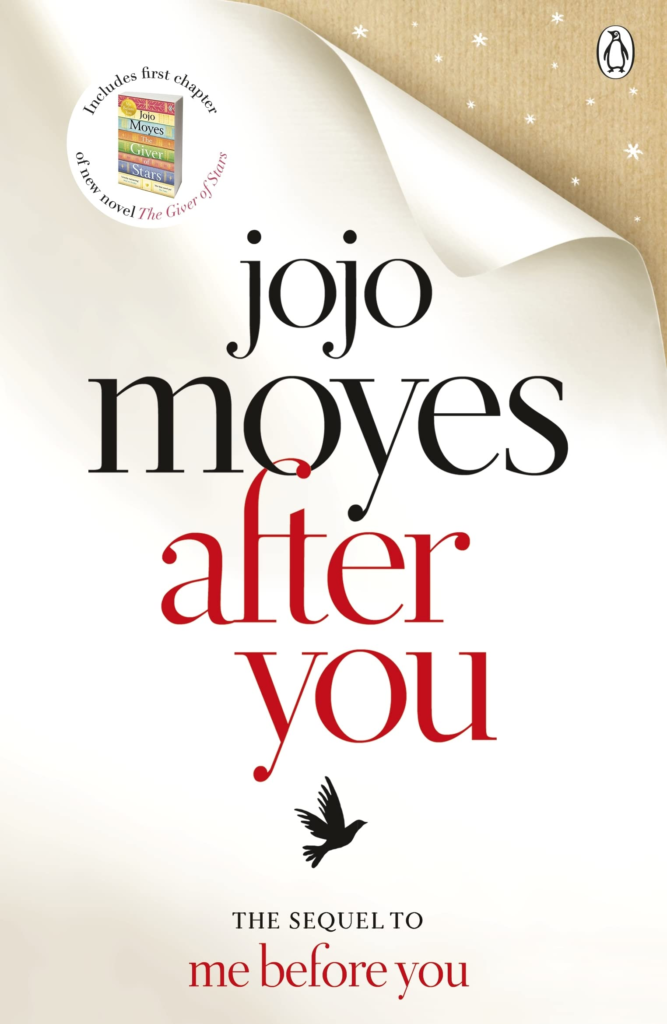Navigating the Aftermath: Grief and Growth in Jojo Moyes’ “After You”

Jojo Moyes’ “After You,” the sequel to her wildly successful “Me Before You,” bravely tackles the challenging terrain of grief and rebuilding after profound loss. While “Me Before You” explored the transformative power of love in the face of impossible circumstances, “After You” delves into the equally complex process of navigating life when that love is gone. It’s a poignant exploration of resilience, self-discovery, and the arduous journey towards finding a new kind of happiness.
The Weight of Unrelenting Grief
The novel opens with Louisa Clark, still reeling from Will Traynor’s death, struggling to find her footing in a world that feels irrevocably altered. Moyes masterfully captures the suffocating weight of grief, portraying it not as a linear progression, but as a chaotic and unpredictable force. Louisa’s attempts to “live boldly,” as Will urged her, are often clumsy and fraught with setbacks, mirroring the reality of the grieving process. She finds herself trapped in a cycle of isolation and self-doubt, highlighting the isolating nature of profound loss.
Finding Community and Shared Brokenness
Moyes introduces a new cast of characters who, in their own ways, are also grappling with their own forms of brokenness. The support group, “Moving On,” provides Louisa with a sense of community and understanding, reminding her that she is not alone in her struggles. The introduction of Lily, Will’s estranged teenage daughter, adds another layer of complexity to Louisa’s journey. Lily’s arrival forces Louisa to confront her own unresolved feelings about Will and to navigate the delicate balance between honoring his memory and moving forward. Their relationship, initially turbulent, gradually evolves into a source of mutual support and healing.
The Raw Reality of Emotional Healing
One of the novel’s strengths lies in its realistic portrayal of the messy and often uncomfortable aspects of grief. Louisa’s emotional stumbles, her moments of anger and despair, are depicted with unflinching honesty. Moyes avoids sentimentalizing the grieving process, instead portraying it as a raw and visceral experience. The book doesn’t offer easy answers or quick fixes; rather, it emphasizes the importance of patience, self-compassion, and the courage to embrace vulnerability.
Redefining Self and Embracing Independence
The theme of self-discovery is central to “After You.” Louisa’s journey is not simply about recovering from loss; it’s about redefining herself in the aftermath. She begins to explore her own passions and desires, independent of Will’s influence. Her newfound independence, while sometimes daunting, ultimately empowers her to create a life that is authentically her own. The exploration of her paramedic training, and the relationships formed there, serve to show this growth.
Criticisms and Enduring Resonance
However, the novel is not without its critics. Some readers found the pacing slow and the plot somewhat meandering, particularly in the early chapters. Others felt that the introduction of Lily, while adding depth to the story, detracted from the focus on Louisa’s emotional journey. But despite these criticisms, “After You” remains a compelling and emotionally resonant novel.
A Testament to Hope and Resilience
Ultimately, “After You” is a story about hope and resilience. It’s a reminder that even in the face of unimaginable loss, it is possible to find new meaning and purpose in life. Moyes’ novel offers a message of comfort and encouragement to anyone who has experienced the pain of grief, demonstrating that healing is possible, and that even after the darkest of times, there is always the potential for light and love to return. It’s a testament to the enduring power of the human spirit to adapt, to heal, and to find joy again, even “After You.”




















